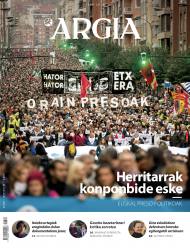Good intentions for the new year
We tend to start the year with a good desire. It has been three years since the implementation of the Sustainable Development Goals (SDGs) promoted by the United Nations (UN) and we can begin with an empathetic look at the environment. In September 2015, nearly 200 countries approved an agreement to boost the development of several societies. These SDGs were pursued between the years 2000-2015 and they wanted to broaden the perspective of the Millennium Development Goals, with uncertain results. In total, seventeen objectives were defined in 2015 and 169 targets were set under these main objectives. This long list, in addition to covering the eleven dimensions of the concept of poverty, addressed other areas related to the conservation of the environment and the reduction of inequalities.
Many think that there are too many objectives that cannot be achieved and that for others it is a list that reflects the complexity of the different societies and the problems of nature that cannot be overlooked. In any case, there are a number of common points among the reflections of the followers and opponents: on the one hand, it is a question of breaking the traditional North-South classification, that is, for the first time, they have stressed that development is the responsibility of all countries and not only of those to which it has been called “underdeveloped territories”; on the other hand, a hierarchy has not been established between the objectives, in some way it is possible to preserve the importance that has been desired. These features have not gone unnoticed, and although it is only a written text, many of those working in these areas have considered them to be novel views.
The UN SDGs are not binding, so it depends on each agent who wants to implement them. Many of us find it surprising that the
implementation of these important issues affecting the whole of society is optional.
However, without denying any new points, there is a criticism that has come to the fore strongly among the sceptics. One of them is the lack of realisation of the objectives. In other words, the objectives have not on several occasions defined the ways to achieve them. What, for example, are the transformative measures that will be activated for economic recovery without damaging the environment? What is more, when we talk about the need for global alliances, for whom and what do we want them for? One of the risks of defining excessively broad ideas is that the most powerful agents at the international and local level adapt in their own way, without meeting the needs of the majority.
Also noteworthy is the holding of a summit in the Ethiopian capital, Addis Abbeba, to establish the avenues and possibilities for financing the SDGs. In the report, various civil society organisations showed the importance of regulating the tax system to large international companies, claiming that the problem of poverty and inequality was systemic. It is known that these demands have been hampered by several countries in Europe and the United States, indicating the difficulty of transformation.
Furthermore, the SDGs are not binding, and so it is up to each actor to implement them and, where appropriate, to interpret and evaluate them. Many of us found it really surprising that the implementation of these important issues affecting the whole of society is optional.
In addition to the limits outlined in the previous lines, many other obstacles have been highlighted in recent years, which are likely to involve addressing highly complex issues. But along with these imperfections, a number of things have been invented, and it cannot be denied that they have received a great deal of support. This is reflected in the initiatives that have been launched in different parts of the world. In our case, there are many people who are making the way for these objectives to be adhered to our reality; in short, it will be better for us to leave their interpretation to large international companies, for the benefit of the majority.
Bidali zure iritzi artikuluak iritzia@argia.eus helbide elektronikora
ARGIAk ez du zertan bat etorri artikuluen edukiarekin. Idatzien gehienezko luzera 4.500 karakterekoa da (espazioak barne). Idazkera aldetik gutxieneko zuzentasun bat beharrezkoa da: batetik, ARGIAk ezin du hartu zuzenketa sakona egiteko lanik; bestetik, egitekotan edukia nahi gabe aldatzeko arriskua dago. ARGIAk azaleko zuzenketak edo moldaketak egingo dizkie artikuluei, behar izanez gero.
Do not look for this connection from Ezkio or Altsasu, let alone crossing the Ebro River through Castejón. The connection, or rather the connections, between the Basque Y and the AVE of Navarre is already a reality. It is these links in the plural that should concern us and... [+]
Don't make a fuss, don't confront, don't victimize... and obey. As oppressed subjects, in this case as Basques, we talk, how many times have we had to listen to them? Ironically, two years ago, at the Euskalale Independentiston Meeting, Esne Arzallus said: "We have arrived here,... [+]
Aurten "Israel Premier Tech" txirrindularitza talde israeldarra ez da Lizarraldeko Miguel Indurain Sari Nagusia lasterketara etorriko. Berri ona da hori Palestinaren askapenaren alde gaudenontzat eta munstro sionistarekin harreman oro etetea nahi dugunontzat, izan... [+]
Intsumituek denbora luzez egindako borroka gogorra eta mingarria izan zen, baina irabazi zuten, eta garaipen hura behin betikoa izango zela uste genuen, atzera bueltarik gabea. Baina badirudi, politikari batzuen ahotik aterata, eskalada militaristari gorazarre egin eta berriz... [+]
Danimarkatik iritsi zaigu berria: 400 urtez estatuak eskainitako zerbitzua etengo du PostNord enpresa publikoak, eta eskutitzak banatzeari utziko dio 2025 urtea amaitzean. Gobernuak adierazi du enpresa publikoak negozioa paketeak banatzera bideratuko duela. Bi arrazoi eman ditu... [+]
“Hondakinik ez platerean!”. Hori zen kontsigna gure txikitako otorduetan. Janariak zeozer sakratu bazukeen, batez ere ogiak; lurrera erori eta, jasotakoan, musua eman behar zitzaion. Harik eta adin zozoan mamia baztertzeko moda etorri zen arte, lodiarazten zuelakoan... [+]
Zenbait estatistikak berretsi dute begiak hondar urteotan ikusten ari zirena: gimnasioak (eta estetika-zentroak eta nolako-edo-halako-terapia eskaintzen duten negozioak) nabarmen ugaldu dira gurean. EITBk plazaratutako datu bat emateko: EAEn 2010-2019 urteen bitartean, zazpi... [+]
Topatu eta topa! Tipi-tapa, elkarrekin ekin eta, bidea, eginean egin aurrera. Mahaiak, aulkiak, koadernoak eta boligrafoak, platerak, konfidentziak, tragoak eta ahotsak, eskuak, ideiak eta barreak, borrokarako besarkada gozoak. Txistulariak bileran, erraldoiak lasterka eta... [+]
Hezkuntzari buruzko legediak, Ekonomia Lankidetza eta Garapenerako Erakundearen eta planetako jaun eta jabeen aginduei jarraituz, ikasleek ikasketa etapa bakoitzaren amaieran “irteera-profil” jakin bat izatea bilatzen du. Ez pentsa profila zerbait itxia eta bukatua... [+]
Martxoaren 14an Donald Trumpek agindu exekutibo bat sinatu zuen, hainbat berri agentziak jasotzen duten diru kopurua asko murrizteko. Kaltetuetako bat United States Agency for Global Media (USAGM) izan zen eta, ondorioz, Voice of America (VOA), Radio Free Europe/Radio Liberty... [+]
Orain dela 20 bat urte, berrikuntzaren inguruan master bat egin nuen. Bertaraturiko gonbidatu batek esan zigun gizakion historian berrikuntza teknologikoaren eragile handiena gerra izan zela. Gerra, halaber, eragile handia da botere harremanen berrikuntzan.
Berrikuntzaz ari... [+]
Zer esango zenioke Palestinako aktibista bati aurrez aurre izango bazenu? Ni mutu geratu nintzen Iman Hammouri nire herrian bertan aurkeztu zidatenean. Eskerrak andre nagusi bat gerturatu zitzaigula eta solaskide roletik itzultzailearenera pasa nintzela.
Palestinako Popular... [+]
Punto Bobo liburuaren irakurketan murgilduta, Itxaso Martin Zapirain egilearen Eromena, Azpimemoria eta Isiltasunak Idazten ikerketa lanean sentitu nuen egiazkotasun eta maila etikoarekin egin dut berriz ere topo. Eta hortaz, hara bueltatu. “Oihu izateko jaio zen isiltasun... [+]
Dirudienez, Euskal Herrian migrazioa arazo bilakatu da azken bi hamarkadetan. Atzerritarrez josi omen dira gure lurrak. Gure kultura arriskuan omen dago fenomeno “berri” horren ondorio. Lapurretak, bortxaketak, liskarrak… Bizikidetza arazo horiek guztiak... [+]



















